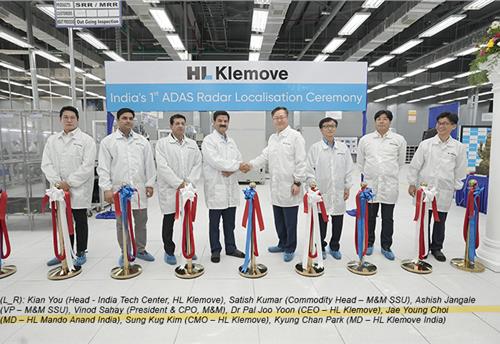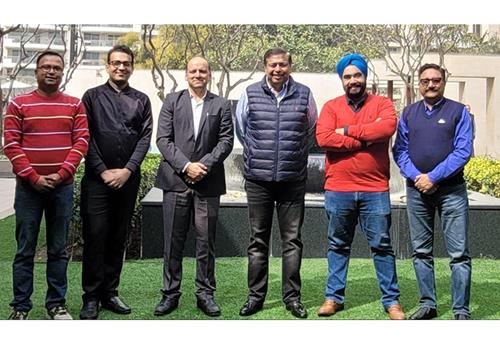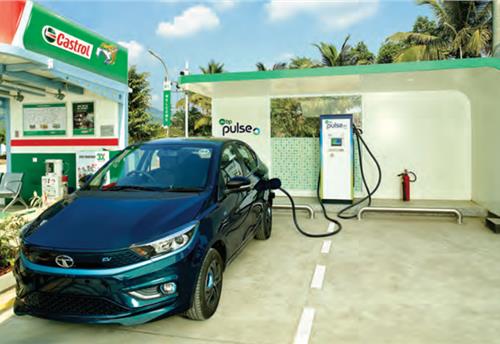2012 Robotics & Automation Special: Interview - Bhaskar Mandal
The automotive industry is a lead industry for our PLM and Siemens continuously keeps introducing new products and solutions.
We have a complete product portfolio for automation from the finest level of detail on the shopfloor to the broadest level of manufacturing – in terms of transparency required at the topfloor.
Our role is not limited to that of a supplier – we are a technology partner to our customers for the entire lifecycle of the manufacturing process.
In which areas of the auto industry do you see a bigger market for your products?
The automobile industry today faces a challenge to not only build the right product but also to build the product right. Also, manufacturers want to build products that are robust as well as cost effective with faster time to market. This eventually means that planning, engineering and production have to deliver first time right. This is only possible by employing the Digital Product Design and Digital Factory effectively and enabling quick translation of the digital factory into the actual manufacturing line. Hence we see a lot of potential for Digital Factory and Virtual Commissioning.
Are OEMs in India asking for automation?
Automated factories and processes are expensive to be rebuilt for every modification and design change; so they have to be highly configurable as well as flexible. Intelligent automation and sophisticated robots and machines should be able to smoothly and rapidly fabricate a variety of customised products (vehicles) on demand.
To successfully reconfigure an entire production line or process requires direct access to most of its control elements – PLC, switches, valves, motors and drives – down to a fine level of detail. Today, this is purely a matter of networked intelligence which is now well developed and widely available in the form of Profinet.
Our customers are asking for this capability to reconfigure their manufacturing line quickly based on demand. At Siemens, we work in co-ordination with the manufacturing design team of our customers to carefully configure the digital factory based on intelligent automation and control elements.
Our broad product portfolio comprising of PLM, automation, drives and control elements as well as electricals helps us in ensuring that the entire manufacturing process can be controlled till the last station. As a result, the OEMs benefit from flexible production lines with high reliability and complete manufacturing cost transparency.
In which region is automation spread the most for the automotive sector?
The hubs with the highest degree of automation are Pune, Chennai and Sanand due to the fact that most of the new greenfield investments have come into these hubs in the last three years.
How cost effective are Siemens' automation devices?
Siemens automation devices offer the best economic value in terms of the complete lifecycle cost. Lifecycle costs include not only the initial investment but also the cost of changes, upgrades, networking, spares and support which is necessary over the lifetime of a manufacturing line.
Any plans to introduce new automation products?
The automotive industry is a lead industry for our PLM and Siemens continuously keeps introducing new products and solutions. Recently we have added new products that help:
• Virtual commissioning of the digital factory line with a real PLC. The finalised PLC code can then be used to directly start the real manufacturing line.
• Enable a single identification of vehicles through the entire manufacturing process.
• Increase manufacturing process transparency and capture the production data used for higher level of product monitoring.
• Enable the complete networking in a manufacturing plant across all shops and processes.
• Enable faster changeover of robots / machines from one setup to a new setup.
How does the Indian auto industry compare with the rest of the world on the automation front?
The automation level in India is approximately 50 percent lower compared to the automation level in the developed economies and 30 percent lower compared to China. However, in India the gap is closing very fast as most of the automotive companies are transforming or planning to transform their manufacturing setup to match world-class levels.
This transformation has gained pace due to global automotive companies setting up manufacturing bases in India as well as Indian companies going global either directly or through strategic alliances.
It is a myth that developed nations will keep leading in knowledge and India will continue to focus on a lower labour cost-based manufacturing. In reality this is changing rapidly and India is gaining importance as a design and engineering centre for the global automotive industry.
The manufacturing volumes in the Indian auto industry can be compared to global manufacturing volumes. Automation needs to be deployed for incoming as well as outbound logistics to optimise the supply chain.
RELATED ARTICLES
Branded content: HL Klemove inaugurates first Local ADAS Radar Manufacturing Unit in India, marks a significant achievement in “Make in India” initiative
The inauguration ceremony was held in the presence of Vinod Sahay, President and CPO of Mahindra & Mahindra Ltd. and Dr....
BluWheelz to 'Green Up' logistics sector
With their EVs-as-a-service solution, the startup is playing it smart with costs and looking to electrify the entire seg...
BRANDED CONTENT: Spearheading the EV revolution in India
Jio-bp is a joint venture between Reliance Industries and BP PLC where both entities have married international expertis...





 By Autocar Pro News Desk
By Autocar Pro News Desk
 17 Sep 2012
17 Sep 2012
 5220 Views
5220 Views









